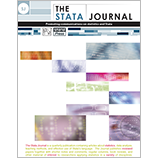Assessing the calibration of dichotomous outcome models with the calibration belt
Giovanni Nattino
Division of Biostatistics
College of Public Health
The Ohio State University
Columbus, OH
[email protected]
|
Stanley Lemeshow
Division of Biostatistics
College of Public Health
The Ohio State University
Columbus, OH
|
Gary Phillips
Center for Biostatistics
The Department of Biomedical Informatics
The Ohio State University
Columbus, OH
|
Stefano Finazzi
GiViTI Coordinating Center
Laboratory of Clinical Epidemiology
IRCCS Istituto di Ricerche Farmacologiche `Mario Negri'
Ranica, Italy
|
Guido Bertolini
GiViTI Coordinating Center
Laboratory of Clinical Epidemiology
IRCCS Istituto di Ricerche Farmacologiche `Mario Negri'
Ranica, Italy
|
Abstract. The calibration belt is a graphical approach designed to evaluate the goodness
of fit of binary outcome models such as logistic regression models. The
calibration belt examines the relationship between estimated probabilities and
observed outcome rates. Significant deviations from the perfect calibration can
be spotted on the graph. The graphical approach is paired to a statistical
test, synthesizing the calibration assessment in a standard hypothesis testing
framework. In this article, we present the calibrationbelt command,
which implements the calibration belt and its associated test in Stata.
View all articles by these authors:
Giovanni Nattino, Stanley Lemeshow, Gary Phillips, Stefano Finazzi, Guido Bertolini
View all articles with these keywords:
calibrationbelt, logistic regression, calibration, goodness of fit, binary outcome
Download citation: BibTeX RIS
Download citation and abstract: BibTeX RIS
|
